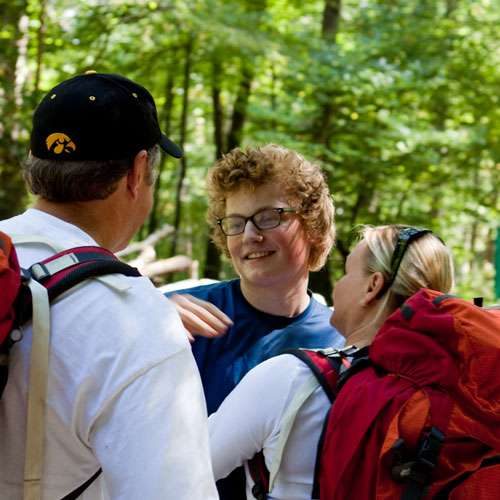Anxiety looks different for everyone that experiences it. While it may be one of the most common and most talked about mental health struggles among teenagers, not everyone responds to anxiety treatment in the same way. Recognizing how attachment styles are influenced by anxiety and vice versa helps loved ones and professionals identify more effective ways of helping teens cope with their anxiety. As social struggles are common in teens with anxiety, wilderness therapy programs utilize relationship-building techniques to help teens face and overcome social anxiety.
Why Are Attachment Styles Important?
All relationships are built around attachment, whether that means someone is easily attached, emotionally detached, trustworthy, or loyal. Attachment often has a negative connotation when used in conversation, even though it is an informative way of describing how you go about seeking security from others, how you handle your emotions, and how you deal with your role as a secure base.
This means that one’s attachment style may also help explain one’s baseline level of security or anxiety and how they deal with stressful situations.
For example, someone with a secure attachment style is more likely to react proportionately to a stressful situation and continue to utilize social support during times they feel overwhelmed or alone. People with anxious attachment styles are more likely to ruminate over situations outside of their control and are not easily reassured. People with avoidant styles are more likely to shut down when anxious and push others away, not because they reject connection but rather because they are uncomfortable showing negative emotions around others.
Types of Attachment Issues
Anxious attachment styles may include:
- Feelings of anger or helplessness in relationships
- Anxiety around and mistrusting of strangers
- Separation anxiety
- Reluctance to get close to others
- Fear of rejection and abandonment
- Desire for attention and validation
Avoidant attachment styles may include:
- Social isolation
- Overestimating self-reliance
- Emotional detachment or lack of emotional awareness
- Unwillingness to be vulnerable with others
- Fear of being clingy or needy
- Being ore likely to seek out relationships but stay at a distance or avoid them altogether
Disorganized attachment styles may include:
- Often unpredictable combination of avoidant and ambivalent attachment styles
- Switching between caregiving and pushing others away
- Attraction to others who are similarly disorganized
- Being more likely to seek validation from others
How Do Anxiety Treatment Programs Address Attachment Styles?
Anxiety treatment programs recognize that relationship struggles are common among many people with anxiety. While people with secure attachment styles may find it easier to trust treatment professionals, connect with peers in a residential program, and use relationships with family members as motivation to work on their anxiety, people who struggle with attachment issues may struggle at first with relationship-based care.
Wilderness therapy programs are relational programs that offer group therapy, team-building activities, and focus on developing close staff-student relationships through multi-day wilderness expeditions. With staff in the field for a couple weeks at a time, teens are better able to work on trusting their mentors and recognize that they have their best interests in mind. This reduces some of their anxiety around rejection and abandonment and increases their willingness to be vulnerable in a group setting. It also helps teens cope with anxiety.
Throughout their time at wilderness therapy, Trails students continuously transition from a wilderness therapy setting to base camp. These transitions help students learn to smoothly transfer newly acquired skills and behavior patterns from one environment to another. This is particularly powerful for teens with attachment issues that have struggled to find consistency across different environments. As they may have learned that their needs will be met inconsistently, this helps them build evidence that they have the same support and tools available to them in different settings.
Trails Carolina Can Help
Trails Carolina is one of the nation’s leading wilderness therapy programs that helps young people ages 10-17 who are struggling with behavioral and emotional issues. This program uses adventure-based therapy to help treat anxiety in teens and help students gain a new sense of self-awareness, confidence, and independence. The skills they learn throughout the wilderness program offer long-term benefits towards their ability to successfully self-navigate in the real world. By removing teens from their fast-paced environment into a safe, nurturing, and peaceful environment, they are able to focus on improving and reflecting upon their behavior.
Contact us at 800-975-7303 to learn more about how our wilderness therapy program helps teens cope with anxiety.
Get started today
Contact us today to learn how Trails Carolina can help your family
Trails saved my daughter’s life. Amanda is an amazing human and a brilliant therapist. I am so grateful to her, Science Steve, and the other wonderful people who could reach my daughter at a time when I could not.
Margot Lowman August 2022
Great life changing experience for our son. After becoming addicted to gaming during covid he was very depressed. At Trails he experienced the wilderness, Science Steve, learning survival skills and top notch therapy and support etc… I highly recommend! This gave our son and our family a renewed family bond full of love and excitement about his bright future.
Winnifred Wilson July 2022
Outstanding clinical work and superb staff! There’s a great culture at this company and it shows with how they engage with families/clients.
Kristin Brace June 2022
Discover If Trails Is The Right Program For Your Child
Take our short online assessment and help us better understand how we can help your family.




